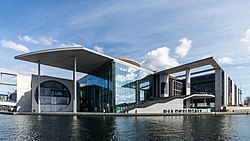German Bundestag
The German Bundestag (commonly referred to as Bundestag) is the legislature of Germany. It meets in Berlin, in the Reichstag building, which was specially rebuilt ready for the Bundestag to move from Bonn.
German Bundestag Deutscher Bundestag | |
|---|---|
| 21st Bundestag | |
 | |
| History | |
| Established | 7 September 1949 |
| Preceded by | Reichstag (Nazi Germany, 1933–1945) |
| Leadership | |
President by right of age | |
| Structure | |
| Seats | 630 |
 | |
Political groups | Government (328)
Opposition (302) |
| Elections | |
| Mixed-member proportional representation (MMP) | |
Last election | 23 February 2025 |
Next election | On or before 25 March 2029 |
| Meeting place | |
 | |
| Reichstag building Mitte, Berlin, Germany | |
| Website | |
| www | |
| Rules | |
| Rules of Procedure of the German Bundestag and Mediation Committee (English) | |
The Bundestag has at least 598 members. Every 4 years the German people vote. After the 2017 election there were 709 members. In the election of 26 September 2021, 736 members were assigned - the base 598 seats plus 138 overhang and leveling seats. After the 2025 election, this was reduced to 630. The next election is expected in 2029.
A party gets seats when it gets at least 5% of the votes or 3 direct mandates. Every voter has two votes, one for a person and one for a party. 299 members each represent a constituency, just as in the British House of Commons or the US House of Representatives. The other half are elected from a party list in each Land. The total number of seats a party gets depends on the number of the second "party votes" it gets.
But if a party wins more constituency seats than its share of the party votes, then it keeps those extra seats. These extra seats, or extra mandates, are the reason the Bundestag sometimes has more than 598 members. If a party gets extra mandates, the other parties get some extra seats too to make sure every party gets exactly its share of party seats. This system of giving extra mandates was changed in 2013. Before 2013, if a party won extra mandates, then it got to put more members in the Bundestag, which gave the party more influence over the Bundestag than it won in the elections.
The Bundestag president is named Bärbel Bas. She oversees the sessions of the body.
German Bundestag Media
The German Unity Flag is a national memorial to German reunification that was raised on 3 October 1990; it waves in front of the Reichstag building in Berlin, seat of the Bundestag.
Bundestag ballot from the 2005 election in the Würzburg district. The column for the constituency vote (with the name, occupation, and address of each candidate) is on the left in black print; the column for the party list vote (showing top five list candidates in the state) is on the right in blue print.
Related pages
- Politics of Germany#Bundestag (election results of 2013)
- German federal election, 2025
Notes
- ↑ Though the by-laws of the Bundestag do not mention such a position, the leader of the largest opposition Fraktion is called leader of the opposition by convention.
References
Other websites
![]() Media related to Bundestag at Wikimedia Commons
Media related to Bundestag at Wikimedia Commons





